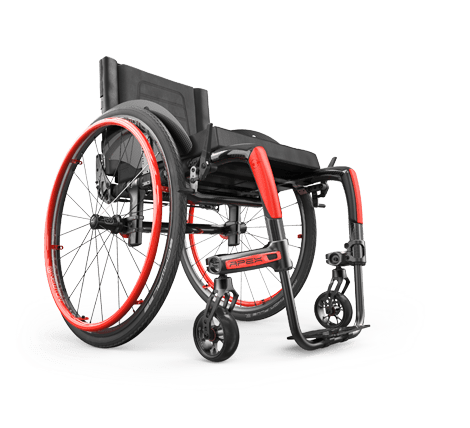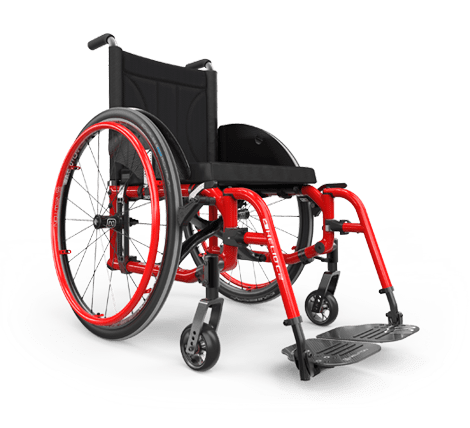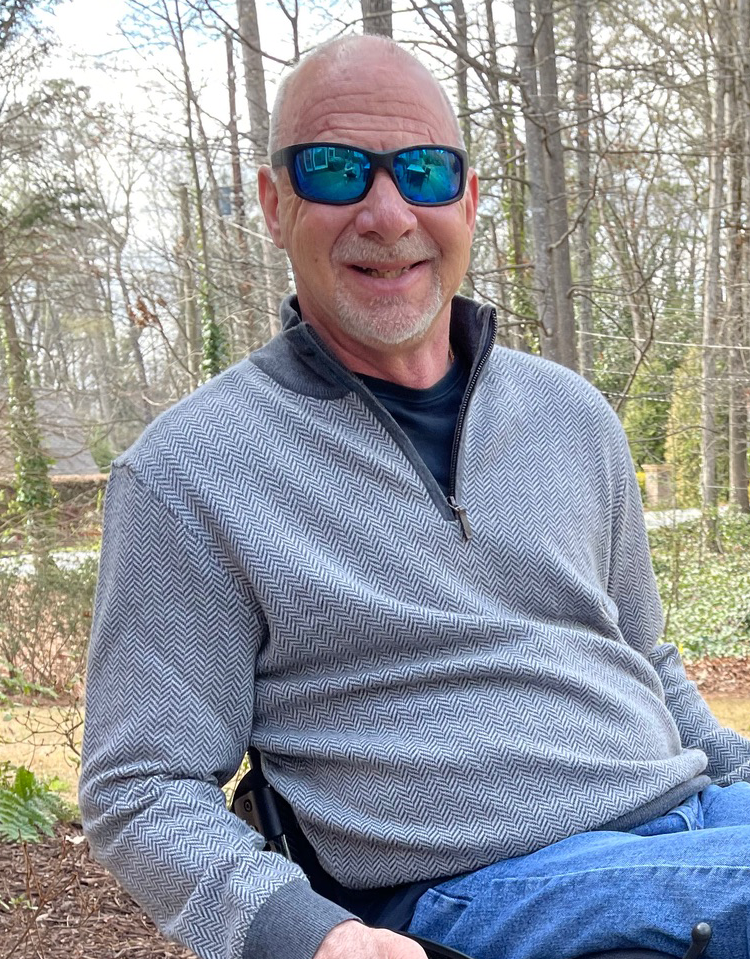Dr. Mitchell Tepper is a Sexuality Educator and Counselor dedicated to helping people with disabilities grasp the full potential of sexual response and expression post-injury or illness. He has a Master’s degree in Public Health from Yale University and a PhD in Human Sexuality Education from the University of Pennsylvania. Most recently, Dr. Tepper produced and directed a soon-to-be released documentary, Love After War, which shares the stories of injured veterans and their intimate partners’ battles to overcome obstacles to intimacy.
Can you tell us how you started working as a sexologist? We heard it wasn’t your initial career path!
I was working on a degree in finance when I broke my neck. I finished that degree after a year of rehabilitation and went on to work in banking. My questions regarding sexuality and potential for future relationships were not fully addressed in rehab. Fortunately, I was adept at finding information on my own through various sources and practice. As I became more involved in disability-related issues, I drifted away from banking and toward improving the plight of people with disabilities. The ability to talk comfortably about sexuality is one of my gifts. I felt it important to share this gift with the disability community, as we desperately needed more discussion in this area.
Could you tell us about your work with people with disabilities?
I help people with all types of disabilities and chronic conditions optimize their sexual health. Sexual health encompasses biopsychosocial elements and includes sexual function, response, expression, and pleasure. I accomplish this through listening carefully, clarifying the nature of their concerns, providing accurate information, offering objective, non-judgmental feedback, and making appropriate referrals when necessary.
Why is it important to understand and talk about sexuality after injury?
Our sexuality is at the core of our identity from our sex at birth to how we express our gender, who we are attracted to, how we form relationships, and how we parent. A serious injury that affects our ability to function and to express our sexuality in ways that we are used to cuts to our core. If sexual health is not addressed, people are left wondering if their sex lives are over, if they will ever find a partner, or if they are in a relationship, will their partner leave them, and will they ever be able to have children or fulfill their role as parents. Left unaddressed, these pestering questions can lead to sadness, depression, anxiety, and avoidance of life affirming, nurturing intimate relationships.
Could you walk us through your history with manual wheelchairs?
I broke my neck in 1982 while working as a lifeguard. Fortunately, I am covered by Workers’ Compensation so I can order the latest and greatest wheelchair available every five years. Like many new quads, when I got out of rehab, I could hardly push along a sidewalk that wasn’t perfectly even. My first two wheelchairs were “lightweight” folding chairs made out of stainless steel. By today’s standards they were tanks, weighing in at about 45 lb plus. At least the lighter chair was easier for my family to put it in the trunk of the car.
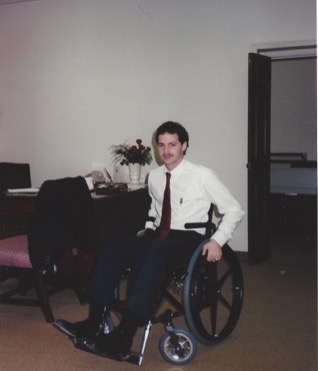
The move to an aluminum chair with a rigid frame in the 1990s was a significant improvement, cutting the weight of the chair essentially in half with a remarkable improvement in efficiency. I was able to use that chair for wheelchair tennis and rugby in addition to everyday use (there were no real custom chairs for each sport then, except maybe the basketball chairs).
With the turn of the century came titanium, dropping the weight under 20 lb with increased strength. I travel a lot, so past frames accumulated many scrapes and scratches. I never had to worry about that with titanium.
Just when you think things could not get any better, along comes carbon fiber! The APEX is by far the easiest chair I have ever pushed! and the fewer pounds make lifting the chair a breeze. I am also loving the Newton Airgrip handrims, nice and sticky and no plastic or rubber coating to gauge and peel off. One year old and they look like new. I also decked this chair out with disc brakes, a real game changer for downhill breaking, and a SmartDrive for long hilly halls.
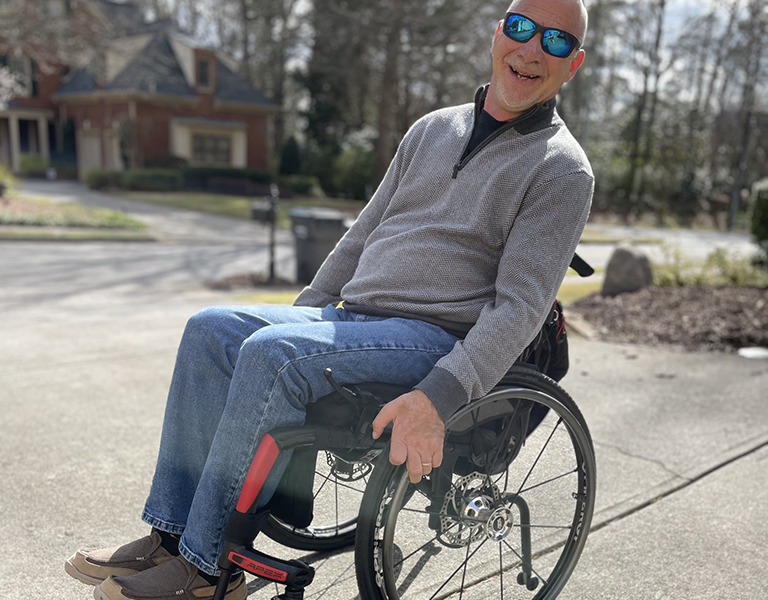
How did you first hear about the APEX?
I was in the market for a new chair so I took a road trip from Atlanta to the Abilities Expo in Dallas. It was there I discovered the APEX. At first, I was intrigued by the shape of the front end, more squared than curved like others. Then I grabbed that flat, padded area when transferring in and I was like, “Oh wow! This makes sense!” Off I went! What a difference a fewer pounds make in combination with the carbon fiber frame. It was a blast! One test-drive and I was sold!
We heard that you have been working on a movie that is to be released. Can you talk to us about it?
I love to talk about my film! Love After War is a feature-length documentary that delves deep into the intimate lives of injured veterans and their partners. It is a story of patriotism, courage, sacrifice, true love, physical and emotional pain, altruism, coming home, and sexual healing. The accounts of their journeys illustrate how each faced the challenges of returning home with a disability and moved from being sexually devastated at the time of their injury to happily in love. All these couples have exhibited sexual resiliency in the face of grievous military-related injuries on their way to restoring emotional closeness and physical intimacy. The film is making its way around the film festival circuit, and I plan to release it in spring of this year. Readers should go to the movie's website and sign up to stay informed.
We really want to thank Dr. Tepper for taking the time to talk to us. You can visit his website to learn more about him and his practice. His movie Love After War will be released in the spring.
To follow Dr. Tepper's path with his APEX C and see the difference for yourself, you can visit the product page.




